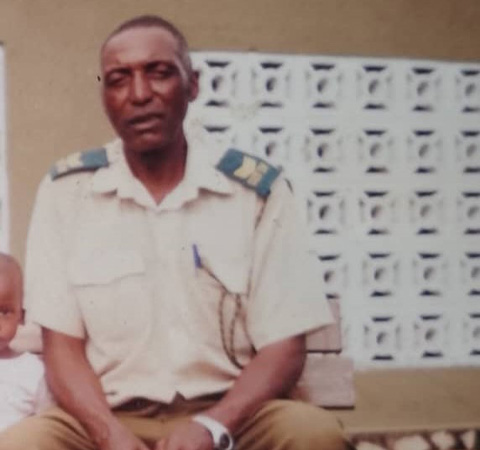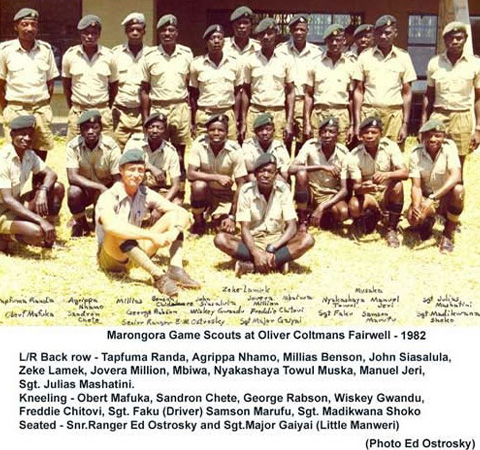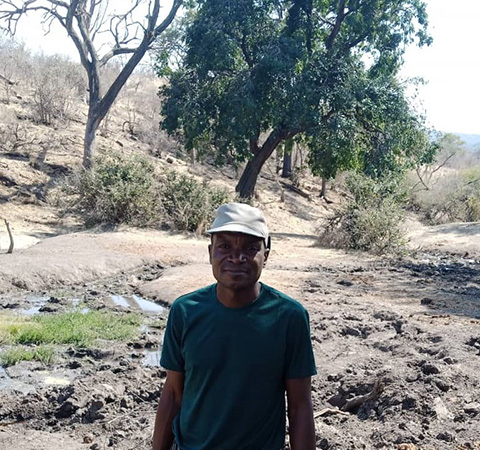A conservation legacy in the Zambezi Valley: The story of the Randa family of rangers

The Zambezi River is the lifeline of the Mid-Zambezi Valley
On World Ranger Day, the International Ranger Federation estimated that more than one-and-a-half million rangers are needed to achieve our global targets by 2030. Yet, the current ranger workforce stands at 286,000, showing the need to invest in a professional ranger workforce.
At AWF, we are reflecting on the significant contribution that rangers have brought to conservation efforts for decades. We narrow the lens to Zimbabwe, and we would be remiss to ignore how the now-retired ranger, Tapfuma Phanuel Randa (Randa Snr), inspired his family to become conservation champions.

Tapfuma Phanuel Randa (Randa Snr) inspired his family to become conservation champions
The 74-year-old retired Department of National Parks and Wildlife Management ranger Randa Snr was employed in 1974 at Marongora National Park in the Mid-Zambezi Valley (MZV) Landscape long before the Department of National Parks and Wildlife Management changed to become what we know now as the Zimbabwe Parks and Wildlife Management Authority (Zimparks). Randa Snr’s modest start in conservation work saw him working as a general hand worker before being promoted to game scout in 1975 and rising to Sergeant in 1976. He was among those who fought against the 1984 rhino poaching crisis, where more than 500 were killed, especially in the Mid-Zambezi Valley.
“In 1980, our anti-poaching patrols intensified when we realized that poachers were devouring our rhinos; back then, we had so many rhinos,” Randa Snr flashbacked. “When we were told that the rhinos were declining in the valley, we took on the fight under Glenn Tatham's leadership.” Glenn Tatham, an anti-poaching legend, was a Zimparks Chief Warden dedicated to alerting the world on the plight of rhinos along the Zambezi Valley.
As he looks back, he recalls his anti-poaching days when he and other colleagues used to trace poachers’ footprints and countless confrontations in their line of duty in the Mid-Zambezi Valley. Undoubtedly, a lot has changed since then.

Randa Snr became a game scout in 1975
Randa Snr is fortunate enough to have lived to tell the conservation story to young people after surviving three decades serving in Zimparks before his retirement almost 15 years ago. He is proud to have his three sons follow in his footsteps as rangers protecting Zimbabwe’s heritage.
“For my children to become rangers, it was through my hard work as a ranger that inspired them. I never committed a crime and was diligent in dispensing my duties. Zimparks team threw me a big farewell party when I retired in 2009,” Randa Snr said. He believes that wildlife conservation should continue upward due to the latest technological advancements that aid in the fight against poaching.
Through funding from the European Union under the CITES MIKE project, for example, AWF has facilitated the installation of digital radio equipment systems in Chewore North and South to improve communication across the landscape, strengthen law enforcement operations systems, and ensure good connectivity and communication links between stations and rangers on patrol.
“The younger generation is now using vehicles and advanced technology; back then, motor vehicles were scarce. We used to do counter-tracking by walking long distances during patrols. We sacrificed a lot,” the retired ranger recalled.
One of Randa Snr’s sons, Thomas Randa, confirms that he was indeed inspired to become a ranger by the adventurous stories his father would narrate—including his nail-biting encounters with poachers in the region, where the rangers would emerge as heroes by apprehending ‘the bad guys.’ As he grew up in that environment, Thomas’ vast knowledge of rivers and mountains in the Zambezi Valley contributed significantly to his exemplary job performance.

Thomas Randa, son of Randa Snr, joined Zimparks in 2007
Thomas joined Zimparks in 2007, more than three decades since his father started and two years ahead of his father’s retirement. He relishes the possibility of working alongside his children one day. This is not a far-fetched dream, as one of them, his 13-year-old son, is already showing interest in conservation; he is part of the environmental club at Dudley Hall, and he is a scout in school.
“There are terrifying moments whereby you are unsure whether you will be back alive. You are not even sure of the type of weapons they (poachers) have, even their tactics. But due to the love of nature, you will endure it all,” he said while paying tribute to the senior rangers in the field, who come in handy with their experience to aid in the apprehension of poachers.
A legacy of conservation spans generations as the Randa family safeguards the wildlife they cherish. The father, Randa Snr, a dedicated ranger since the 1970s, witnessed the direct threats and effects of declining wildlife populations within the Zambezi Valley. His son, Thomas, follows in his father’s footsteps; he became a ranger in 2007, committed to continuing the fight against poaching and actively contributing to the region's wildlife population growth.
Together, they share their knowledge and passion for wildlife with a new generation. Randa Snr’s 13-year-old grandson, who eagerly absorbs their teachings, is ready to play his part in conserving the natural wonders surrounding them when his time comes. We at AWF applaud the Randas as they embody the spirit of conservation, united in their mission to safeguard Zimbabwe's wilderness for future generations.